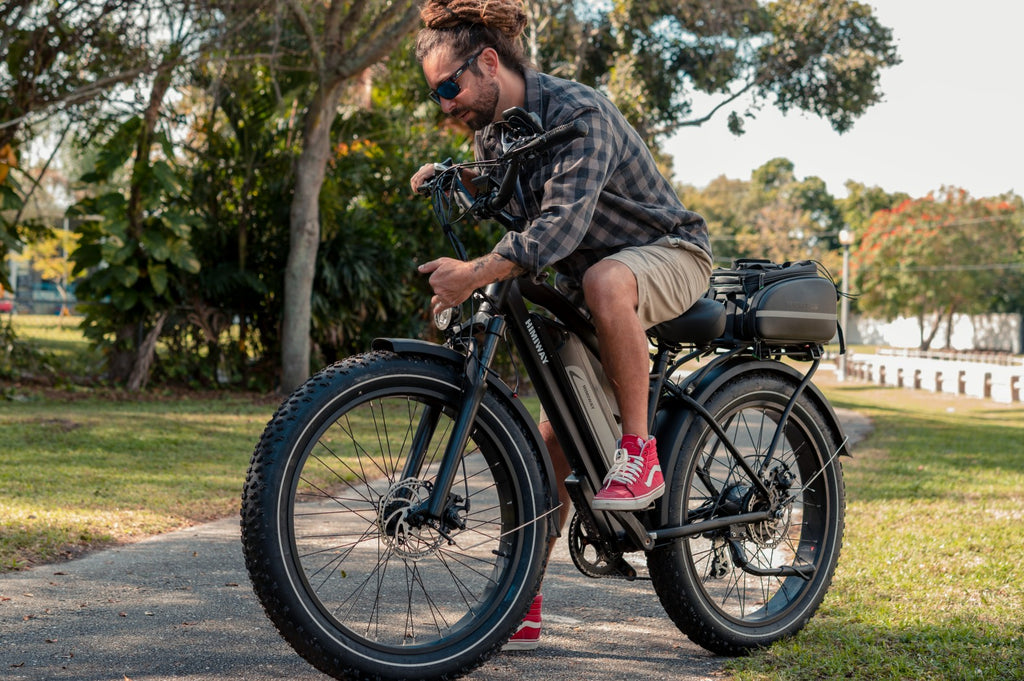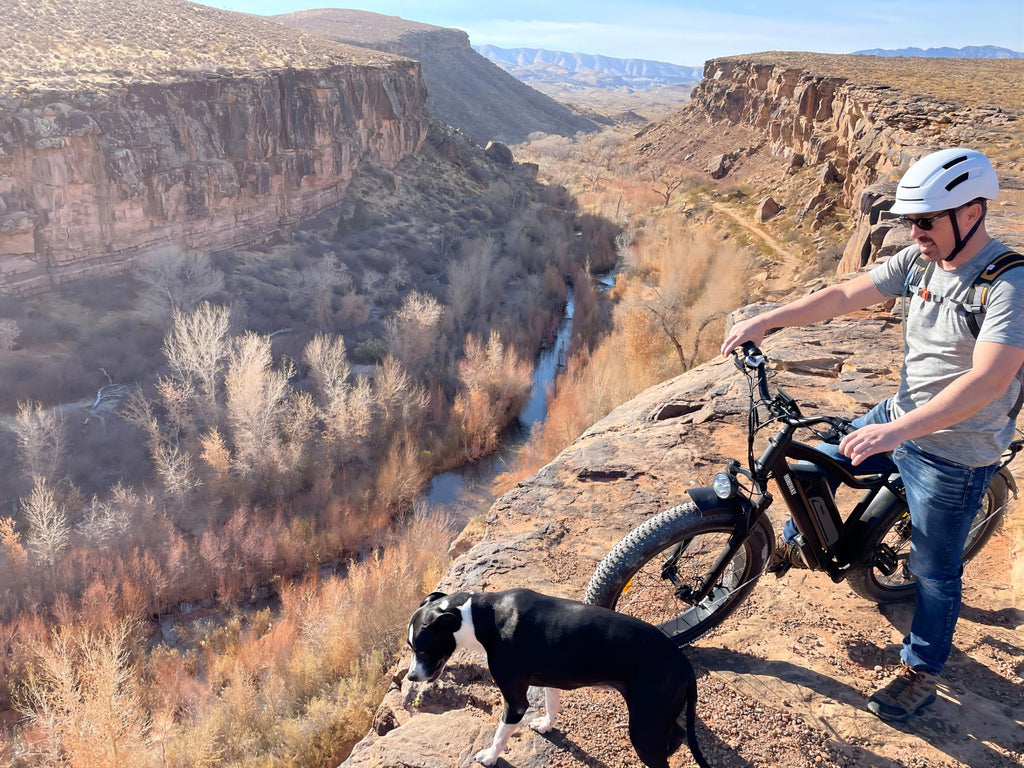Mountain biking is another level of excitement for professional riders to enjoy. If you are a beginner and have yet to explore rugged terrains, you must consider riding in mountains with rocky routes. Your first ride may not meet your expectations. It's exhilarating and enjoyable but also frightful and nerve-racking. It gets more accessible and more fun with time.
When mountain biking, the last thing you would wish yourself is to fall while riding. Therefore, the first thing you must consider before embarking on this challenging terrain is body position and bike handling. You must know how to balance yourself to avoid dispositioning your body, which may lead to serious injury if care is not taken. This article will reveal the keys to keeping upright and riding like an expert, guaranteeing you won't fall when mountain biking.

The Art of Balance: Mastering Body Positioning
If you want to master your balance when mountain riding, you need to consider the following:
Finding Your Center of Gravity:
Mountain riding requires a delicate balance of you, your bike, and gravity. To overcome it, you must first comprehend your center of gravity. Mastering your center of gravity is critical whether you ascend a steep climb or descend a rough slope. You must ride more gracefully and prevent embarrassing falls, especially if your weight is balanced over your bike's wheels.
Mountain riding is like a chaotic rollercoaster through the woods, full of twists, turns, and bumps. To discover and keep a balanced body position, imagine yourself as a monkey swinging across the forest. Maintain a comfortable yet solid grasp on the handlebars like our ape friends do on tree branches. You are not Tarzan, but you will feel just as daring!
Monkey See, Monkey Do: Copying the Pros:
What better way to learn something than copying someone who is an expert? You might have heard the “monkey see, monkey do” phrase before. Even if you haven’t, it is just a way of saying the animal replicates what they see by humans. This method can be applied to master your body position when mountain biking.
Emulating professional techniques in body position ensures safety and makes it easier for you to understand the proper techniques faster and easier. Your confidence on the bike will develop as you improve at imitating the pros.
Professional mountain bikers use different body positions to maintain their body while riding. Some include:
Attack position:
The attack posture is the cornerstone of mountain riding and is commonly used by professional riders. It entails standing on the pedals with your knees and elbows slightly bent and your weight concentrated over the bike. This method allows you to move your body with the bike while maintaining balance, which is extremely useful while mountain biking.
Weight Distribution:
Another body position by professionals, called weight distribution, displays their excellence at carefully spreading their weight. When descending steep stretches, riders transfer their weight backward to avoid falling over the handlebars, and when climbing, they lean forward to keep traction on the rear tire.
Bonus Tip: Doing the Chicken Dance:
The art of balance cannot be over-emphasized when mountain biking. Another essential tip you can consider when mountain biking is the chicken dance practice, a fun and practical approach for novices to enhance their mountain bike balance and body control. This method is similar to supporting a chicken on one leg, which will help you better grasp weight distribution and balance on the bike.
Follow these Step-by-step instructions for the chicken dance exercise to influence your overall riding stability.
1. Look for a level and broad environment around the mountain with lots of space to move about securely.
2. Get on your bike, but wait to begin pedaling. Stand on the pedals using the attack position method. This method slightly bends your knees and elbows while maintaining your weight centered over the bike.
3. Assume you're a chicken standing on one leg. Lift one foot off a pedal and balance on the other. Keep your “chicken” foot near the pedal, ready to replace it if you lose your balance.
4. After a while, move to the other leg, much like a chicken might. Maintain smooth, steady movement.

Gear Up for Safety: Essential Equipment to Prevent Falls
Safety is a necessity when it comes to mountain biking. Just as you would need an electric bike to use these rugged terrains, so would some essential equipment.
Choosing the Right Helmet:
Most professional mountain bikers refer to helmets as lifesavers due to some experiences they have encountered while riding. Wear a helmet before riding on the mountainside to prevent injury, especially during unexpected falls. Not only should you wear a helmet, but wear a helmet that fits firmly to your head.
Before getting yourself a helmet, you need to consider its features. The himiway helmet is an advanced improvement on how a helmet should be. It contains a solid material and has MIPS technology built into it. The essence of this technology is to lessen the rotational motion of some collisions that would have been transmitted to your head.
Gloves, Knee Pads, and Elbow Guards:
You should protect your head and other body parts to avoid bruises and scrapes. You must wear gloves during mountain biking to avoid slippage from the handlebar, mainly as a beginner; they help to make your ride comfortable and flexible.
HIMIWAY knee pads, elbow guards, and gloves are constructed with sturdy materials and have features that offer superior control and grip.
Trail Ninja Strategies: Boost Your Riding Skills
You need to follow these guidelines to boost your riding skills.
Power of the Eyes:
If you are ready to boost your riding skills, you must first understand riding with focus and staying focused. Maintaining a forward vision is essential as you can see obstacles on the way before getting to them and easily avoid them, ensuring your safety.
To Preserve Forward Vision, Focus on the trail a few meters ahead of you at all times. You won't be able to predict what's ahead if you are looking elsewhere. Also, it would be best if you trusted your riding abilities. When faced with challenges, your trust will lead you to make the required adjustments.
Brake Like a Pro:
Mastering your brake control is also one way to increase your riding skills. A brake is essential on mountain biking as you use it consciously and unexpectedly. Sudden braking and hashing can lead to you not having control, so you must learn braking techniques before considering riding in rugged terrains. One technique in braking is simultaneously using the front and rear brakes, yielding the best-balanced braking power. This method gives you better control and helps keep your bike from sliding.
Lowering Your Saddle:
A trick for better bike handling and stability on descents is to lower your saddle. It improves your stability and control by enabling you to transfer your weight back and lower your center of gravity. Most modern mountain bikes have adjustable saddles you can easily adjust when needed. To adjust the saddle height, push it down. Drop it somewhat for descents to increase the space between your body and the seat. Ensure the saddle is firmly placed after adjusting it to the appropriate height. Test the saddle's stability by placing your weight on it and making any required adjustments.
Boosting Confidence with HIMIWAY's Electric Fat Tire Bikes
What better bike will boost your confidence when mountain biking, if not Himiway’s electric fat tire bikes? The use of electric bikes will quickly help to reduce the strength and effort you will use due to their electric and pedal-assist features.
Unleash the Power: The Advantages of Electric Assistance:
The electric fat tire bikes from HIMIWAY are made with your riding comfort in mind. These bikes can provide both power and pedal assistance. It allows you to receive an additional push when necessary, particularly on rough terrain. Because the electric aid reduces the strain, climbing hills becomes more accessible, and maintaining balance becomes second nature. You'll discover that HIMIWAY's electric bikes make conquering those uphill obstacles possible and pleasurable. Knowing you have that extra support when things become tough will encourage you to push into rough terrain and discover new pathways. If you want to go mountain biking, consider one of these bikes.
Safety Precautions When Mountain Biking
To have a safe and memorable ride, consider some of these precautions.
Know your limits:
Always know your limits when you are riding. Yes, exploring and covering more difficult terrains when mountain biking is necessary, but you must consider whether you are ready to go there. It is essential to pick the trails that match your skill level to prevent unnecessary accidents. But with time, you can explore and cover more ground.
Ride with a friend:
Riding with others makes mountain riding safer and more fun. Riding with a group or a riding companion provides numerous advantages and a safety net. You may seek support, exchange expertise, and receive help in an emergency or fall. Your outdoor experiences get to another social dimension when you ride with others, which increases your value.
Conclusion
As you already know, maintaining an upright position when mountain biking is a delicate ballet of balance, gear, expertise, and wise decisions. These tips are your secret weapon for experiencing the excitement without any injury. So put them into practice, and enjoy mountain riding with unflinching confidence. Remember to look at HImiway's selection of electric fat tire bikes, the epitome of stability, power, and safety on two wheels. Keep your balance ride like an expert, and let the fun begin!














































